
How To Revise For IB Exams With IB Study Planner Guide
HOW TO REVISE FOR IB EXAMS WITH IB STUDY PLANNER GUIDE
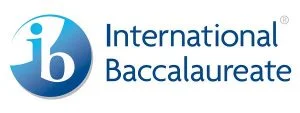

HOW TO REVISE FOR IB EXAMS WITH THIS IB STUDY PLANNER GUIDE?

This article contains Tutopiya’s How to Revise for IB Exams with an IB Study Planner.
Compared to other IB exam revision study planners and guides, this article is a road map.
A kind of study/revision companion for students to keep with them at all times.
Irrespective of the IB subjects taken, the amount of work and studying a student has to do
if you follow the steps on this IB Study Planner Guide then you will see a pattern forming.
This pattern helps students put their thought processes and routine of studying for exams in an orderly fashion.
As you start at the top of the article and scroll down, you will see order and a guide that takes into count all the important aspects and tips for a fruitful study or revision session for IB students
WHY THIS IB STUDY PLANNER GUIDE IS USEFUL TO REVISE FOR IB EXAMS?
This IB Study Planner Guide is essentially a guide for IB students at every part of their IB revision journey.
The study plan given below includes:
All the steps and tips that will guide you through an effective IB Exams revision planning procedure.
Provide tips for IB students to take into account all parts of organizing, planning, delegating and even taking care of one’s health during exams.
In the end, you won’t need any other planner once you understand the process and steps of this IB planner.
As your comprehensive planning is the key to success in every field.
HOW THIS IB STUDY PLANNER GUIDE CAN HELP TO REVISE FOR IB EXAMS IS SHOWN BELOW…
1ST PHASE
The first phase of this guide deals with the importance of getting the student’s goals into foresight.
Once the goals come in sight, then come the steps of organizing, planning and making a schedule.
These steps will show students what needs to be done to achieve their goals.

-
ORGANIZE
Organization is the stepping stone to success.
When one is organized then the rest of the journey becomes an easy one, irrespective of the field of study or employment.
Being organized is about creating a system.
A system for the student to manage time and resources he or she has at disposal.
Be it a set of past papers or notebooks, the student who knows how, when and where to use the resources effectively, succeeds.
An organized student will keep all the notes, books, materials, course work files and assignments in an organized manner.
So, when the need arises it becomes easy for students to find what they are looking for.
Students everywhere have been in a situation where they have had to study a chapter last minute for an exam.
However, due to all the scattered notes and worksheets on the desk, they are unable to find the notes for that chapter.
Rather than using that valuable time to study, students waste so much time looking for their materials and notes.
Organization will always keep you one step ahead.
As a result, it should begin right at the beginning of the year when the students take up the IB course and sit for their first classes.
Maintaining proper files and folders for each subject is important.
This makes studying, reviewing, referencing and planning easy.
-
PLAN: IMPORTANT DATES

Planning is the next step to effectively revising for IB exams.
Students must plan HOW they are going to revise or study for IB exams after organizing the resources and materials to revise.
Students must make sure all the necessary dates and times for the IB Exams and Course work Submissions have been noted down
This will constantly remind the students and prevent them from forgetting the dates.
Second aspect of planning is to divide the time assigned to the revision of subjects for IB Exams.
Students must divide and delegate time to what they have planned to revise and fix a duration.
This will show the student how much can be achieved in a day.
Therefore, students can then decide which subjects need to be prioritized and which ones need a read through.
To plan is to mentally decide what the student wants to achieve and how.
Whether you are a last-minute student or someone who has begun revision earlier, planning is necessary for both cases.
Simply put, planning, prioritising and being alert about the important dates are important.
2ND PHASE
This phase talks about putting the organizing and planning part of the IB study planner into action to succeed at revising for IB exams
-
MAKE A ROUTINE/SCHEDULE
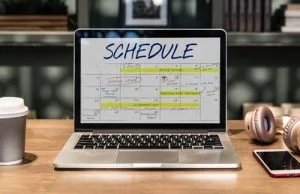
Once the organizing and planning are done, the next step is to make a routine or schedule.
Routines or schedules are a way of creating a habit within the IB students to achieve the plans made.
To plan means is to decide what needs to be done to achieve a goal.
Routines are created for students to begin the tasks and jobs that need to be done to achieve the goal.
To achieve a total of Grade 7 in IB Diploma HL Biology, for instance, the student will need to complete the following tasks:
“Revise the lessons learnt in school, practice past paper questions, and make short notes”.
As a result, the student will have to make a routine in a day.
They have to note down all the tasks needed to obtain grade 7 in IB Diploma Higher Level Biology.
No matter how difficult a task is, sticking to your schedule means the student has to complete it.
Often, the routine might vary or change as one task may take longer.
In conclusions, the key is to stick to your schedule no matter what.
For every journey, you need a pathway.
As you progress along the journey you see milestones that tell you where you stand.
The IB Exams are like a journey.
The syllabus, subject guides, and the IB curriculum are used as the milestones.
They show the students where they are on their journey to reach the exams successfully.
It is absolutely important for students to use subject guides.
This gives students a direction while revising for IB exams.
Thus, allowing the students to check if they have covered everything in the syllabus and subject briefs.
-
PUT INTO ACTION

Ever heard of the phrase ‘Practice What You Preach’?
The above phrase means that it is not enough to just read the article ‘How to Revise for IB Exams With IB Planner’.
You must use the IB Planner to actually physically do the work and accomplish the tasks to achieve your goal.
Students must put their plans to action and physically get to work.
No matter what the distraction, ‘Where There Is A Will, There Is A Way!
Most times, students focus on just passing the exams or aiming for top grades to get into University.
The whole idea of the IB curriculum is to incorporate a world-class education within students.
So, that they may grow to be global citizens and apply the knowledge they learn from their educational environment.
Instead of only memorizing your notes, try learning and understanding the material.
This will make the study/ revision process much more enjoyable and enlightening.
Students should take this chance to enhance their knowledge and truly work hard.
It all boils down to how badly you want to score the top grades.
How well do you want to write the Theory of Knowledge Essay, for yourself?
You have to keep that motivation burning inside of you.
It’s important to physically and mentally prepare yourself for IB revision and do the best you can.
-
TIMED PRACTICE FOR IB PAST PAPERS
If you have not been practising with IB past papers while timing them, then you are missing out on a very vital revision guide.
Especially if you are doing last-minute revision this is one of the foremost things to do.
Putting yourself under timed pressure will allow you to truly test yourself when practising with IB past papers.
3RD PHASE
The 3rd Phase deals with small lifestyle changes.
Students can adapt to these changes to help boost the pace and quality of their revision for IB Diploma Exams.
-
GO OFFLINE!

Asking students to go offline or to stay away from their Watsapp, Instagram, Facebook and other Social Media Websites is impossible.
Nevertheless, it is crucial for students to stay away from electronic devices and social media website.
This will help them to study effectively for IB exams.
If you are doing last-minute IB revision then it is important that you avoid getting distracted.
Especially by the electronic devices around you right in the last lap towards the finishing line.
It may seem harmless to reply to just one message or one comment on Facebook.
But, what you don’t realize is that getting distracted for one second will lead to hours of distraction, delay, and browsing on the Internet.
So, it’s better to GO OFFLINE instead.
It is not like you have to stay offline until your exams are over.
You can always login or check your Watsapp in your study breaks.
All the movies, Facebook posts, Instagram pictures and TV series that you are going to sacrifice watching till your exams are over will still be there for you to watch.
But, your exams will not comeback.
So, you have to decide what is more important.
-
ASK FOR HELP!

Sometimes no matter how much you organize, plan, make a schedule or practice, things will get tough.
Especially if you are diving into last-minute IB revision.
You might feel stressed and lost.
Very often the last-minute fatigue and uncertainty will kick in.
All the fears and doubts will arise.
But, it’s ALRIGHT to feel this way and it’s NOT the end.
The easiest way to get over all the fear, doubt and stress is, to talk to someone.
Talk to your parents, teachers, siblings and student councillors.
Explain your problems, even if it means accepting that you should have started revision earlier.
All these people are a valuable support system and ASKING FOR HELP OR SUPPORT IS NOT BAD.
Another way you can get help is by getting extra academic support if you are weak at certain IB subjects
Academic help can be in the form of extra classes at school or online IB tuition.
Compared to wasting time travelling to tuition, Tutopiya offers expert Online IB tuition in the comfort of your home.
Tutopiya provides a boost to students, both who are starting to revise from the start or last-minute revision students.
-
AVOID PANIC & PROCRASTINATION
Panic and Procrastination are two deadly words that will destroy every move you make to revise.
Neither of the two will benefit you.
So, do not entertain these two words in your mind.
Getting panic attacks is a common sign when studying last minute.
But they can be dealt with.
Making a point of doing simple meditations by doing mindful breathing will reduce panic.
Panic arises when you feel that there is a lot to do but so little time.
It brings in a lot of doubt and worries about failure.
When you are doing a very last minute revision then there shouldn’t be any place for doubt or worry.
This will only waste valuable time that can be dedicated to studying.
Procrastination is another evil that keeps hovering in students mind.
Always think of one simple question.
Will this moment come back?
Your answer should be No, so let me give this revision my best.
-
USE EFFECTIVE LEARNING TOOLS

Effective tools that aid in learning and revising for IB diploma exams are:
- Mind Maps- Helps to organize complex information
- Flashcards- For quick reference and revision
- Highlighting Important Keywords or Concepts- To study keywords, definitions, and question words
- Post-it Notes - Make short notes near long ones, and put examples and other reminders

-
STAY HEALTHY
It’s very easy to neglect yourself when in stress and trying to do a lot last minute.
Eat well, eat healthily and stay hydrated.
The last mile before the paper is not exactly an amazing period to try new fad diets and keto plans.
You can switch to a more healthy diet and snacking habit to help boost your mind.
Having healthy meals filled with a balanced spread of nutrients will keep you charged throughout the day.
Snacking on mixed nuts, energy bars, fruits and vegetables will energize you in your study breaks.
In order to perform well at the IB exams and to revise well with the IB planner, you MUST eat and drink right too!
So, your body and mind both can handle the stress and physical strain.
FREE PRINTABLE IB PLANNERS FOR GOAL SETTING, DAILY IB SCHEDULE, WEEKLY REVISION, AND IB SUBJECT REVISION PLANS
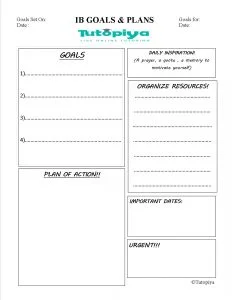
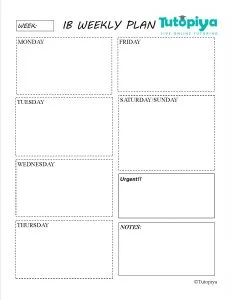
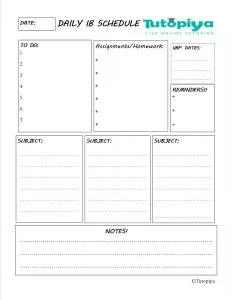
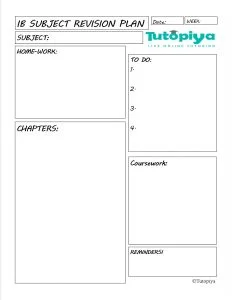
Written by
Tutopiya Team
Educational Expert
Related Articles

Which Is More Difficult, IB or IGCSE? A Detailed Comparison to Help You Choose
IB vs IGCSE difficulty explained. Compare syllabuses, assessments, & workload. Make the right international education choice for your academic future.

Personalized Learning: The Future of Global Education Starts Here
Unlock your potential with personalized learning! Discover how IGCSE, IB, and A-levels are revolutionizing global education with tailored support.

Maximizing Success in the IB Program: Strategies and Resources from Tutopiya
Maximize IB success with Tutopiya's strategies & resources. Master IB, IGCSE, A-levels, and international education with expert online tutoring.




